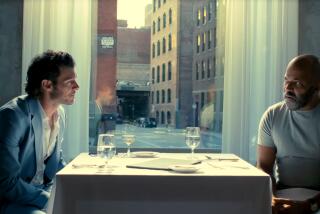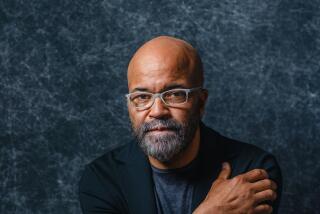JAZZ REVIEWS : Bill Cunliffe: He’s His Own Man : In his Spaghettini show, the keyboardist displays a healthy respect for Thelonious Monk’s music without mirroring it.
SEAL BEACH — As the 1989 winner of the Thelonious Monk Piano Competition, Bill Cunliffe carries a unique burden. The Boston-born keyboardist and graduate of the Eastman School of Music, who first gained notoriety with the Buddy Rich Orchestra, will be forever linked to the late, eccentric pianist’s compositions and quirky rhythmic style. And there are few who cast bigger shadows than Monk.
But Cunliffe showed himself to be every bit his own man Sunday at Spaghettini. In a relaxed trio outing before a handful of listeners, he showed a healthy respect for Monk’s music without appearing derivative. Indeed, the keyboardist’s approach more recalled the richness of Art Tatum’s style than Monk’s quirky rhythmic and chordal approach. Like both these predecessors, Cunliffe is a musician who puts a lot of grace into his playing.
The pianist paid tribute to the competition’s namesake with a medley of the master’s better-known compositions: “Rhythm-A-Ning,” “ ‘Round Midnight” and “I Mean You.” Throughout, he emphasized Monk’s melodic beauty or, in the case of “Rhythm-A-Ning,” the sheer inevitability of the theme’s progression.
But the improvisations were more indicative of Cunliffe’s style, with a warm narrative sense heightened by unexpected chords or the persistent push of his probing left hand. As smoothly as they flowed, the tunes were not devoid of rhythmic twists, with the keyboardist stalking behind the count here, or jumping a beat there.
Arriving late from another gig and still awaiting drummer Dave Hooper’s arrival, Cunliffe, who’s frequently heard in rhythm sections around Southern California and, less frequently, leading his own trios or quartets, warmed up in a duo with bassist Luther Hughes. They started with a blues that moved through a number of rhythmic variations, then took a more expressive tack during “If I Were a Bell.” Halfway into the Monk trilogy, Hooper, with only half his kit assembled, jumped in with brushes hissing across his snare and understated hi-hat smacks, which seemed to free Cunliffe for more lyrical pursuits.
A pair of Cunliffe compositions, “Starlit Eyes” and “Brooks” (both pulled from a forthcoming album with his group, Porcupine), gave good views into his writing talents while further establishing a personal identity. Both tunes revealed a sensitive, Bill Evans-like approach, with the kind of warmth and accessibility designed for popular success. The keyboardist beefed up the gentle nature of the pieces with harmonic depth and chord changes that cut into their ballad-like predictability.
The session offered a chance to hear Hughes working a more mainstream stance. He acquitted himself well without being overly ambitious during solo spots. His pairing with Cunliffe before drummer Hooper’s arrival was especially revealing, with the bassist getting deep, woody tones from his electric instrument. Hooper added snap without overpowering, punctuating nicely with cymbals and toms while relying on his snare for the rhythm track.
More to Read
The biggest entertainment stories
Get our big stories about Hollywood, film, television, music, arts, culture and more right in your inbox as soon as they publish.
You may occasionally receive promotional content from the Los Angeles Times.









